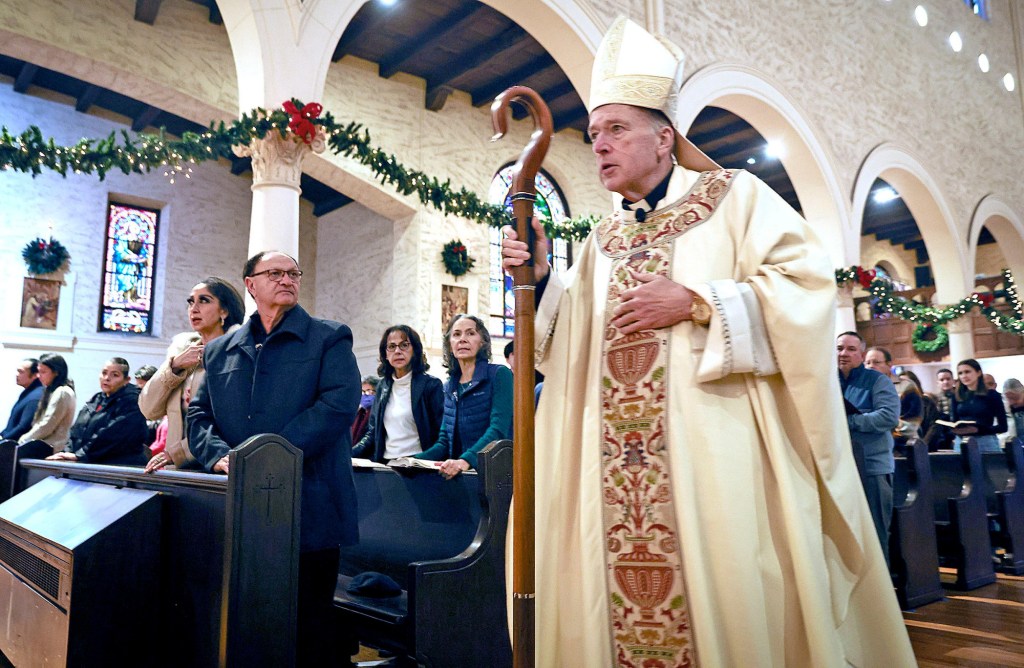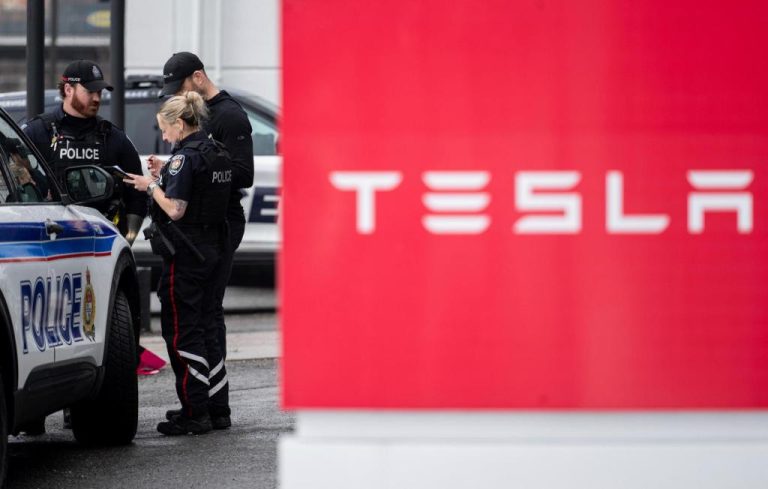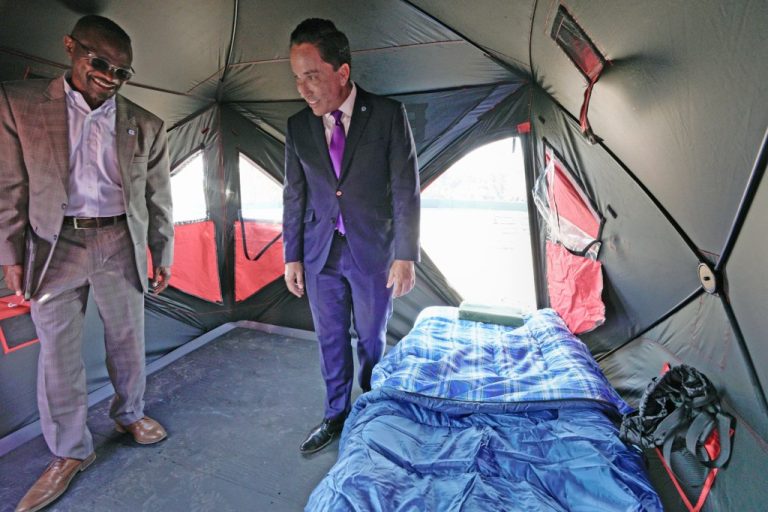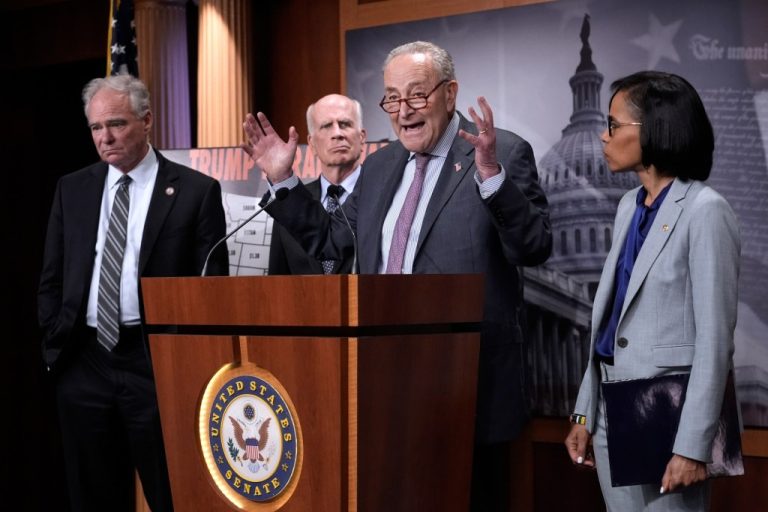
Pope Francis is moving the head of San Diego’s Roman Catholic Diocese to Washington, D.C., placing a prominent ally, as well as a supporter of migrant and LGBTQ communities, in the nation’s capital as President-elect Donald Trump prepares to launch mass deportations and a rollback of transgender rights.
The Vatican on Monday announced that Cardinal Robert McElroy would take over the Metropolitan Archdiocese of Washington starting in March.
McElroy, 70, has led the local diocese for almost a decade and in 2022 was appointed to the College of Cardinals, making him the first San Diego leader to ever join the highest-ranking body within the world’s largest Christian church.
“I am grateful for the opportunity to serve the Catholic community in our nation’s capital and for the confidence His Holiness has placed in me, but I have truly loved the last ten years I’ve spent as bishop of San Diego,” McElroy said in a statement. “I have never in my life felt more welcomed, more supported or more rewarded than I felt sharing my ministry with the priests, the women religious, and the faithful parishioners of our diocese.”

It was not immediately clear who might replace McElroy in San Diego. Yet there are more potential candidates nearby than in previous years, partially because McElroy’s ascension has gone hand-in-hand with the region’s growing prominence within Catholicism. San Diego only broke away from the Los Angeles diocese in the 1930s — recent history in a church that measures time by the century — and McElroy has helped expand the number of leaders below him, known as auxiliary bishops.
The cardinal appointed Michael Pham and Felipe Pulido to those roles in 2023. Each was born outside the United States, Pham in Vietnam and Pulido in Mexico, while San Diego’s third auxiliary bishop, Ramón Bejarano, is a native Texan but spent much of his adolescence in Mexico.
McElroy joked several years ago about why the Pope had made him a cardinal. “Of all of the cities in the United States, the one that comes closest to having the climate of heaven is San Diego,” McElroy once told a packed gym at Cathedral Catholic High School, and “the Pope can’t pass by heaven.”
But the new role nonetheless gave him a bigger stage to defend two of the Pope’s biggest priorities: Protecting immigrants, which for McElroy often meant supporting the local nonprofit Catholic Charities, and adopting a softer, if not exactly wholly affirming, stance toward the LGBTQ community.
Not long after his appointment, McElroy published an essay in the Jesuit magazine America calling for LGBTQ Catholics to be given communion. “Pastoral practices that have the effect of excluding certain categories of people from full participation in the life of the church are at odds with this pivotal notion that we are all wounded and all equally in need of healing,” he wrote.
The blowback from more conservative Catholics was swift, with one fellow cardinal effectively calling McElroy a heretic.
He’s also faced criticism amid continued fallout from the church’s sexual abuse scandals. Critics have accused local leaders of slow walking the removal of one priest, Jacob Bertrand, after a woman accused him of sexual assault. (Bertrand was eventually sentenced to probation and pulled from the ministry.) An analysis by The San Diego Union-Tribune further found that the diocese offloaded hundreds of properties around the same time that California made it easier for victims to sue, potentially reducing the value of future payouts.
The diocese returned to bankruptcy court last year amid hundreds of lawsuits alleging abuse by priests. Jeff Anderson, an attorney who represents victims around the country, said in a statement that the move represented McElroy’s “priority of secrecy and self-protection.”
Church officials have denied that the property decisions were an attempt to skirt responsibility and McElroy has repeatedly said more must be done to repair the damage from years’ worth of abuse.

The cardinal has been a soft-spoken presence in San Diego even when addressing hot-button issues. At an anti-abortion rally downtown two years ago, McElroy came off less as a culture warrior than a pastor asking parishioners to defend all human life, from prisoners on death row to low-income residents lacking quality health insurance.
The public prayer he recently offered up for Trump struck a similar tone, asking that he and other newly elected leaders “transform our political culture so that genuine dialogue and devotion to the sacred dignity of the human person will characterize our government at every level.”
Nonetheless, McElroy has arguably been preparing his entire life to confront somebody like the president-elect.
In 1989, he published “The Search for an American Public Theology,” a book that wrestles with the Catholic church’s proper role in the United States. McElroy at one point warns against fusing faith and patriotism, saying the combination can form a type of cult. “The ‘high priest’ of this cultic form of civil religion was usually the president of the United States,” McElroy wrote, “who could inspire in the American people the conviction that they were being faithful to God’s will without having to bother about the often troublesome question of just what that will demanded.”
McElroy will replace the retiring Cardinal Wilton D. Gregory in Washington D.C.
An administrator will temporarily oversee San Diego’s diocese starting in March until a new bishop is appointed.





